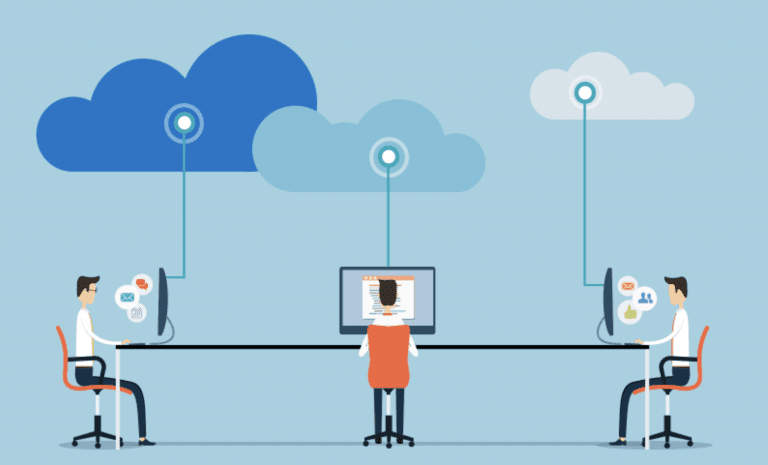Moving Your Small Business to the Cloud
If your small business is suffering from an outdated infrastructure, then moving to the cloud can modernise your company operations.
A cloud-based infrastructure has many advantages over a traditional infrastructure; but crucially, it gives businesses a solution designed to fit their needs. Cloud solutions like those we provide, are future-proof; capable of adapting and changing alongside their businesses. This means an end to annual infrastructure replacements, and significant savings on your capital spending.
So what should you be doing to move your small business to the cloud?

Move Traditional Software to SaaS
Your employees may have to do a lot of admin work as part of their job, and therefore probably rely upon documentation software. Traditionally, this would have to be installed on every staff member’s computer individually, but with cloud software, it can be shared amongst your employees in a much simpler way.
SaaS, or Software as a Service, is a cloud solution designed to make your essential software more accessible and easier to implement. SaaS solutions such as Microsoft’s Office 365, provides your employees with classic admin software such as Word and Excel, with more freedom.
An Office 365 package for your business means that every one of your employees has access to the latest version of admin software, via their own individual user accounts. This means that employees are no longer confined to a single device, but can instead use Office 365 on multiple devices via their account. Applying this SaaS means that your business can implement its software in a much more efficient manner, and benefit from the freedom that comes with it.
Move Traditional Document Storage to Cloud Storage
You may currently be storing your digital documents via traditional methods; on your computer hard drives, or on your in-house servers. However, doing this can both restrict your employees and cost your business more in capital expenditure. Storing documents on a hard drive limits your available space and requires your employees to carry additional equipment. Whereas storing documents on your in-house servers means having the expense of maintaining your own equipment, and restricting usable office space.
Moving to cloud storage frees your business from these restrictions, and allows new options for storing and accessing documents. Instead of storing documents on in-house equipment, cloud storage allows you store and access your documents via a hosted server. This means less capital expenditure, less maintenance, and the freedom to access your documents from any location, with any device.
Microsoft provides its own cloud storage service called OneDrive, which can be integrated with any Office 365 account. There are also browser based cloud storage services such as Dropbox or Google Docs. We also provide our own cloud storage services here at Redsquid.
Move Traditional Data Collection to a CRM System
You may currently collect customer data and contact details via excel or some other form of traditional documentation. But this can limit your employees’ ability to easily access essential customer data, and thus potentially slow sales and good customer interaction.
With a cloud solution such as a CRM (Customer Relations Management) system, your business can automatically collect and store important customer data. CRM systems such as Salesforce or Pipeline, can provide your employees with a platform for them to easily store and find their customer contacts. These systems are stored online, meaning that they can be accessed from any location with any device, giving your employees more freedom to work.
CRMs can help your employees give your customers a more personalised buying experience, which is proven to boost sales and general customer satisfaction. We’ve created a list of our recommended CRM systems, which should help you find one to suit your business.
Move Traditional Communications to Cloud Communications
Your business communications are most likely builton traditional platforms, which all serve their purpose but could be preventing your business from achieving its full potential.
Having standard phone lines may limit your out-of-office employees to receiving professional calls on their landline, or giving out their mobile number as a professional point of contact. These limitations could be reducing your employees’ ability to take more sales, and preventing your business from having a more professional image.
Cloud-based communications systems, or VOIP (Voice Over Internet Protocol), can help your employees to take more calls and promote a more professional business image. VOIP communications systems like OneNet provide employees with a single number for all their devices; which not only means that they’re more likely to successfully receive calls, but they can also market a more professional contact number for their mobile.
Other cloud communications include Microsoft’s own instant messaging service; Skype for Business, and their cloud email service; Outlook, which can both be accessed on multiple devices and integrate with each other.
Moving your business to the cloud has a lot of benefits; it frees your employees and makes your business more efficient. Transferring these elements of your infrastructure from their traditional forms to their modern cloud counterparts, will ensure that your business remains capable and relevant through the future.
For help with your move to the cloud, feel free to contact our customer service team on 0208 166 4540, or on our webchat below.
Want to share it with your friends?
